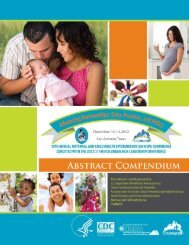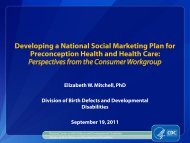Conference Abstract Compendium Examples from the ... - CityMatCH
Conference Abstract Compendium Examples from the ... - CityMatCH
Conference Abstract Compendium Examples from the ... - CityMatCH
Create successful ePaper yourself
Turn your PDF publications into a flip-book with our unique Google optimized e-Paper software.
2009 <strong>CityMatCH</strong> Urban MCH Leadership <strong>Conference</strong>Re-designing <strong>the</strong> Black Infant Health Program in California: Positive leadership formaximum impactPRIMARY CONTACT:Reggie Caldwell, LCSWHealth Equity ResearcherCalifornia Department of Public Health1615 Capitol AvenuePO Box 997420Sacramento, CA, 95899-7420Phone: (916) 650-0373Fax: (916) 650-0304Email: reggie.caldwell@cdph.ca.govCATEGORYInfant mortality and morbidityRacial and ethnic health disparitiesFOCUSProgram Policy FocusISSUECO-PRESENTER(S)/AUTHOR(S):Laurel Cima, laurel.cima@cdph.ca.gov (Author)The California Department of Public Health, Maternal, Child and Adolescent Health (CDPH/MCAH)Division places a high priority on addressing <strong>the</strong> persistent poor pregnancy outcomes thatdisproportionately impact African-Americans. Infant mortality rates have declined in California, yetAfrican-American infants are more than twice as likely to die as white infants and African-Americanwomen have more than triple <strong>the</strong> risk of pregnancy-related death compared to o<strong>the</strong>r racial/ethnic groups.California’s Black Infant Health (BIH) Program was established in 1989 to reduce high infant mortalityrates among African-Americans in <strong>the</strong> state. Under CDPH/MCAH’s leadership, BIH is undergoing astrategic re-development to maximize its impact.SETTINGBIH provides community-based, culturally-sensitive health promotion and support services to pregnantand parenting African-American women at risk of adverse birth outcomes in 17 local health jurisdictionswhere over 90% of all California African-American births occur. Between 1997-2007, BIH served 28,330women and 19,791 infants. Compared to <strong>the</strong> population of African-American women in California, mostBIH clients are at high risk, medically and psychosocially. Data suggest that BIH may be improving birthoutcomes by decreasing <strong>the</strong> number of very low birth weight infants and shifting <strong>the</strong>m into <strong>the</strong> mid-lowbirth weight category, yet it has not had an impact on <strong>the</strong> Black-White disparity in pregnancy outcomes.PROJECTBecause of <strong>the</strong> lack of progress in reducing infant and maternal health disparities CDPH/MCAH engaged<strong>the</strong> University of California San Francisco, Center on Social Disparities in Health to conduct anassessment of BIH with <strong>the</strong> goal of re-designing <strong>the</strong> program for maximum effectiveness. The assessment22







